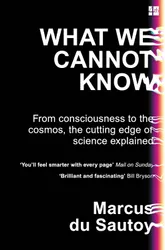This book explores the limits of science, not in terms of what we’ve so far found out as a civilisation, but in terms of what we could ever find out. Are there fundamental limits to what we can ever know about the universe, or questions that we’ll never be able to answer? Marcus du Sautoy considers several areas in which science may not help us to answer the questions we have about the universe.
The first area he considers is the concept of chaos: the idea that there are systems whose future states we cannot predict because small changes in starting conditions result in large fluctuations of behaviour, and we can never determine the starting conditions accurately enough. He uses the example of a die, and whether you could ever accurately predict what face it will land on.
Later, du Sautoy considers quantum mechanics, where Heisenberg’s uncertainty principle puts limits on what we can know about the state of a system, and where the collapse of the wave function seems to result in true randomness. After these, the book also covers consciousness and some of the uncertainty introduced to mathematics by Gödel, as well as concepts like infinity, whether we live in an infinite universe, and whether we could ever figure this out from within the confines of our own universe.
As you might expect, there is a section about the possibility of free will. Although it doesn’t explore the subject in as much detail as some other books, du Sautoy compares a primitive chatbot (the book was written before the widespread use of large language models like ChatGPT) to a human interlocutor. Amusingly, on asking the bot whether it has free will, the bot replies with a lyric from the song Freewill by the band Rush (although the author doesn’t seem to realise that this is where it comes from).
As du Sautoy is a mathematician, he approaches many of these topics from a mathematical perspective. At times this illuminates challenging subjects in a new and interesting way, and this gives the reader a sense of learning about these topics at the same time as the author. As an outsider, he is prepared to question the accepted interpretation of quantum mechanics, for example. But there are also times when he seems to skip over some of the basics in order to get more quickly to the point he’s making, and there were times where I got a little lost.
To me it seems that du Sautoy is a little more open minded than Sabine Hossenfelder was in Existential Physics (a book which covers many of the same subjects). His views are also more in line with my own about what is within the scope of science to investigate and discover, and is not keen to exclude subjects as being outside the scope of science. He explores ways in which we might be able to determine if there was anything before our current universe, or if there are other universes outside of our own, for example.
Overall, I found this a really enjoyable book to read, giving me fresh perspectives on familiar topics and exposing me to lots of new ideas.
